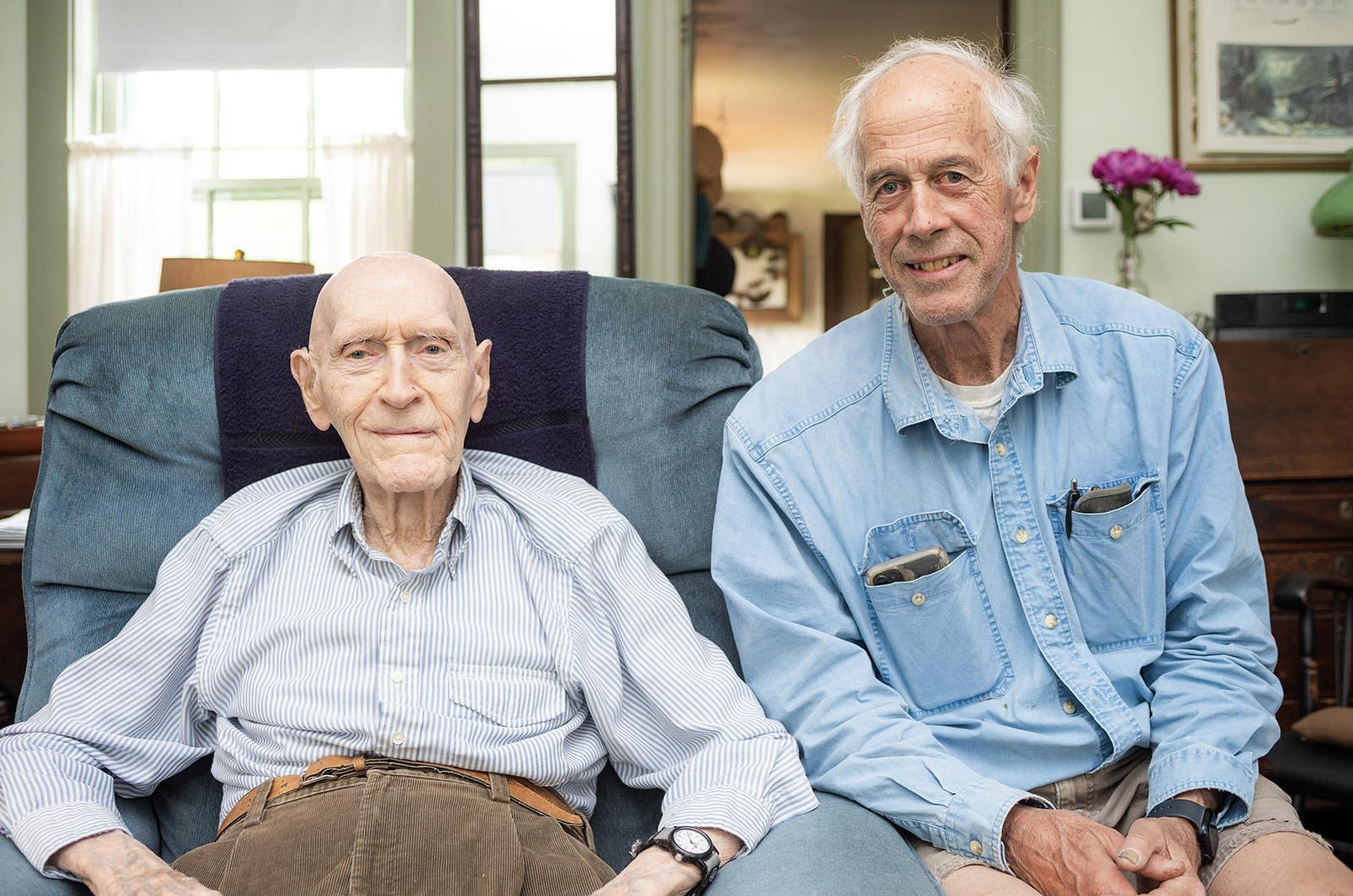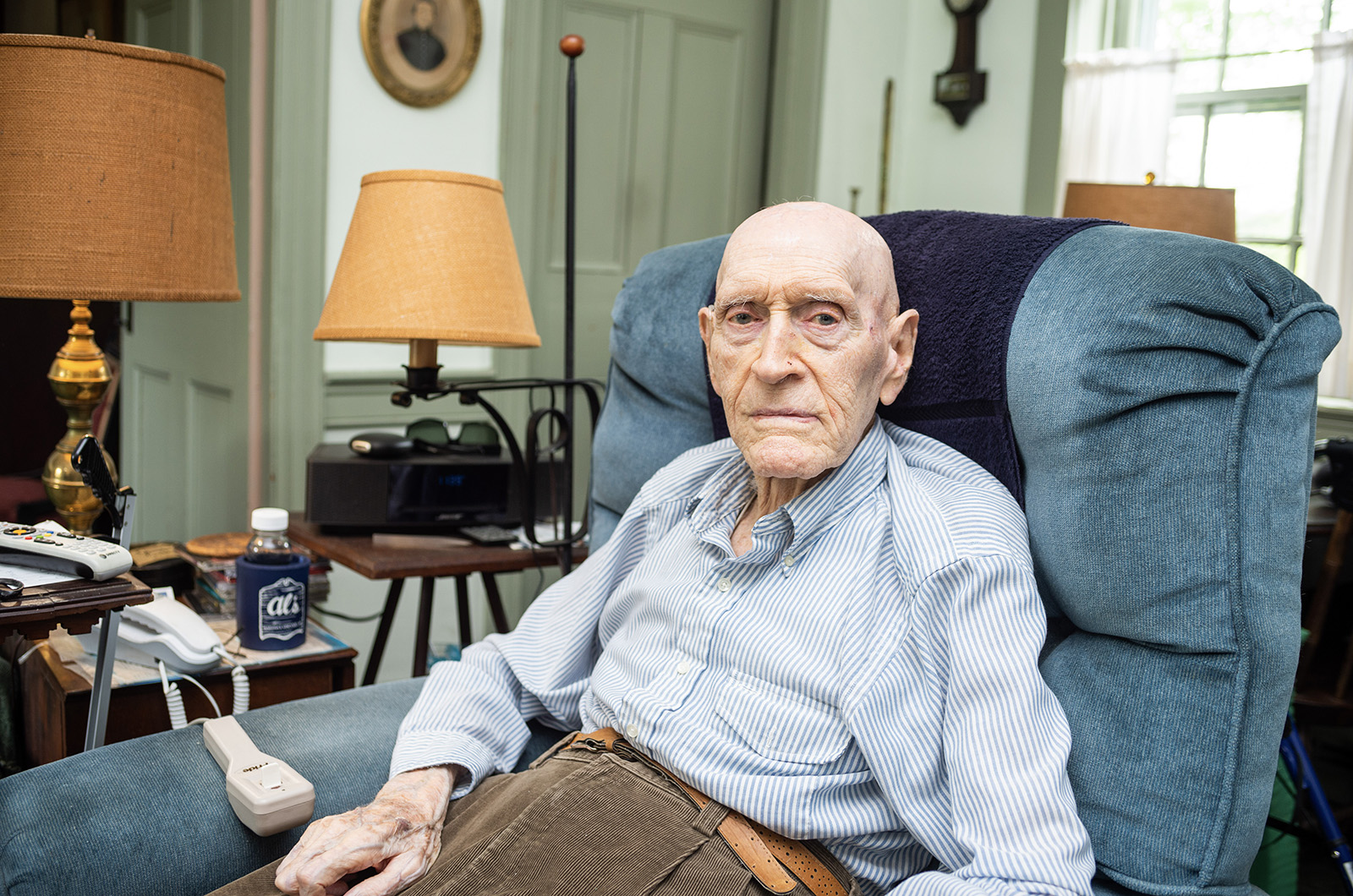When he was a boy of no more than eight years old, Clifton Athearn went for a ride in his father’s Model T. It was the 1930s, and West Tisbury was little more than a village, home to only about 200 residents.
Large gatherings were uncommon in those days, Mr. Athearn said in a recent interview just a few weeks shy of his 100th birthday. When he and his father arrived at a hayfield on Edgartown-West Tisbury Road, a small crowd had formed. He recalled they were huddled at the forest line, feeding a little bird.
“My dad, he pointed out the bird to me and he told me it was a heath hen. I was so young then, that everyone who had seen it is gone, but here I am,” said Mr. Athearn. “That’s my claim to fame. It may or may not be true that I’m the last living person to see a heath hen.”
Born a century ago on a very different Martha’s Vineyard and having served as a medic in Germany during World War II, Mr. Athearn is a living link to the past. He celebrates his 100th birthday on June 30.
“I don’t think I ever got too philosophical about anything,” he reflected. “I just went with the flow. That’s about it.”
Mr. Athearn grew up on a sheep farm about a mile outside of West Tisbury’s town center, far from most of the other families.
“We were an ordinary farm family. It was a lot of work,” he recalled, and not the kind of work he enjoyed very much. There is a reason he never got in to farming himself, turning instead to a career in the medical profession.
Outside of family gatherings with his many aunts and uncles, there wasn’t much of a social scene in town, though he did recall his parent’s card-playing club coming to the house on occasion.
“I tried to listen in to the conversations but that didn’t work out too well,” he said.
Much of his childhood, he said, was spent exploring the woods, and he was never much for socializing with other kids. He began school in second grade in West Tisbury and transferred to Tisbury for high school.
Upon graduation, he started work as an orderly at the Marine Hospital — now home to the Martha’s Vineyard Museum — working as a lab technician. A couple years after he started work, however, the last major offensive of World War II commenced and he was drafted.
“That’s what got me over there, the Battle of the Bulge. They needed more troops,” he said.
After a stint at an Idaho air force base, and a rigorous and unpleasant infantry training in Texas that he still vividly remembers, Mr. Athearn was shipped off to Europe.
“I went on the Queen Elizabeth luxury liner, but there were, like, 12 to a state room,” he said of the trip.
He landed in Scotland, went by train to England, then crossed the channel to join Gen. George Patton’s third army.
“Luckily, I missed the worst of it but there was destruction,” he recalled of the despoiled French countryside.
After the Battle of the Bulge, Mr. Athearn continued with the 317th Infantry Regiment to the German interior, where he was among the troops that liberated the Buchenwald concentration camp.
“I saw plenty of prisoners, all of them in very sad shape,” he remembered. “I don’t recall talking about it too much afterwards. We all saw the same thing.”
Mr. Athearn stayed in Europe for two years after the war, continuing his Army medical work before returning to the America, where he repeated his medical technology training.
“The Army school was a bit sketchy,” he said with a smile, a product of the timely need for medics during the war.
Afterwards, he spent the next several decades working at the university hospital at Rutgers Medical School in New Jersey. In his free time, he attended Broadway shows in New York, where Mr. Athearn figures he saw nearly every production at one point, taking advantage of the $2 standing room tickets.
He frequently came back to West Tisbury during vacations, and returned to the Island full-time when he retired in 1986, moving into his grandparents’ house.
“I’ve spent a lot of my time puttering around this ancient house,” he said.
In terms of advice for younger folks, Mr. Athearn claimed he doesn’t have much to offer, but did supply an unorthodox longevity tip: drink less water.
“I never did drink water as a form of recreation,” he said, chuckling.
Mr. Athearn said that, in his younger years, he would often go the whole day with just a breakfast cup of coffee.
And though he claims not to have much advice for the younger generation, Clifton’s nephew Jim Athearn said his uncle still has much to offer.
He is the classic model, Jim said, of the old-school Athearn family ethic.
“Everybody who meets him says he’s such a gentleman,” Jim said. “They say us Athearn men are nothing too remarkable, but we’re always polite.”








Comments (15)
Comments
Comment policy »